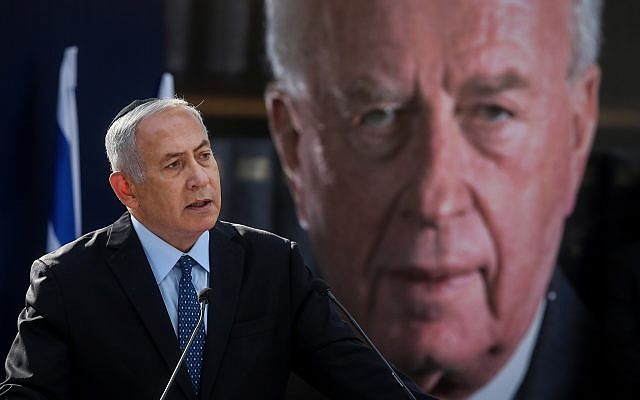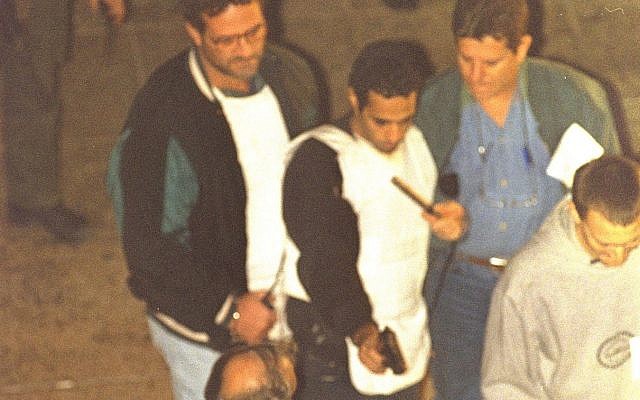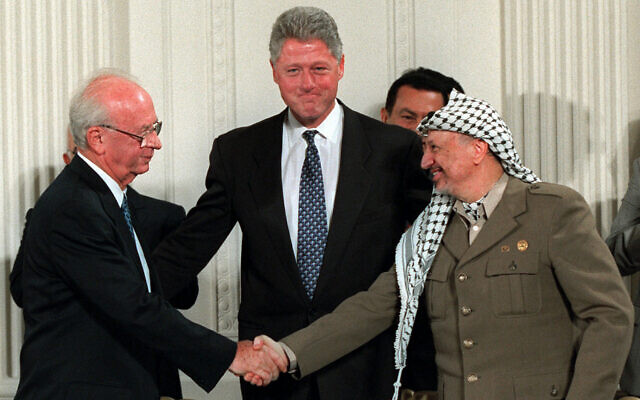Opposition leader’s office says protocol does not require him to attend and he will speak at later Knesset ceremony; move comes amid long-running tensions with Rabin family

Opposition leader Benjamin Netanyahu announced Sunday that he would not be attending the official state ceremony to mark 26 years since the assassination of Yitzhak Rabin on Monday.
Netanyahu gave no reason for his decision, and his office only said that protocol does not require him to attend the ceremony at the Mount Herzl national cemetery in Jerusalem and that he would speak at a special session to be held later in the day at the Knesset to mark the killing.
Netanyahu has attended the ceremony — held on the Hebrew anniversary of Rabin’s death — in previous years when he was prime minister, as did the opposition leaders.
However, there is a long-standing tension between Netanyahu and the Rabin family who have accused him of playing a part in the incitement against Rabin prior to his death. Netanyahu has regularly rebuffed the allegations and has characterized them as a form of “political assassination.”
Rabin was murdered on November 4, 1995, by Yigal Amir, an extremist Jew, who was opposed to the Oslo Accords and the handing over control of portions of the West Bank to the Palestinians as part of the landmark peace agreement.
In the weeks before the assassination, Netanyahu, then head of the opposition, and other senior Likud members attended a right-wing political rally in Jerusalem where protesters branded Rabin a “traitor,” “murderer” and “Nazi” for signing a peace agreement with the Palestinians earlier that year.

Amir shot Rabin to death at the end of an event in Tel Aviv called to highlight opposition to violence and to showcase public support for his efforts to make peace with the Palestinians.
Netanyahu last year defended himself, saying it was his duty to express his opposition to the Oslo Accords.
“I asserted my right to express a different position. It was not only my right, but also my duty,” Netanyahu said. “I vehemently opposed the calls of ‘traitor’ directed toward him but I thought he was wrong and mistaken in the direction he took. It was an error to make peace with the enemy.”
He also compared large-scale protests against him, calling on him to resign as prime minister in the wake of his corruption trial, to the incitement against Rabin.
Rabin was a legendary Israeli military leader, commanding a unit in the pre-state Palmach fighting force and then rising through the ranks as a career soldier to become Israel Defense Forces chief of staff at the time of Israel’s Six Day War victory.
He then launched a political career that saw him serve two stints as prime minister.

After he was elected premier for a second time in 1992, he sought to make peace with the Palestinians, trying in vain to forge a permanent accord with PLO leader Yasser Arafat.
In 1994, he was awarded the Nobel Peace Prize along with then-foreign minister Shimon Peres and Arafat for his part in signing the Oslo peace accords.
As reported by The Times of Israel
